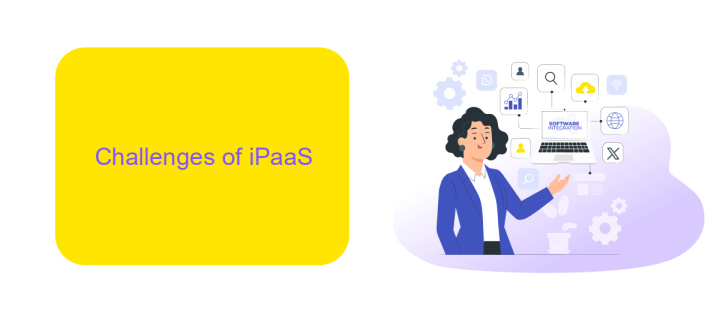iPaaS Challenges
Integration Platform as a Service (iPaaS) has revolutionized the way businesses connect and streamline their diverse applications and data sources. However, despite its numerous advantages, organizations face several challenges when implementing iPaaS solutions. These challenges range from data security concerns to integration complexity and scalability issues. Understanding these obstacles is crucial for leveraging iPaaS effectively and maximizing its potential benefits.
Introduction
Integration Platform as a Service (iPaaS) has revolutionized the way businesses manage their data and applications. However, the journey to seamless integration is not without challenges. Companies often grapple with issues such as data security, scalability, and the complexity of integrating diverse systems.
- Data Security: Ensuring that sensitive data remains secure during integration is a paramount concern.
- Scalability: As businesses grow, their integration needs become more complex, requiring scalable solutions.
- Diverse Systems: Integrating a variety of systems, each with its own protocols and standards, adds layers of complexity.
Services like ApiX-Drive offer robust solutions to these challenges, enabling businesses to automate and streamline their integration processes. By providing a user-friendly interface and a wide array of pre-built connectors, ApiX-Drive simplifies the integration of different applications, making it easier for companies to focus on their core operations.
Challenges of iPaaS

One of the primary challenges of iPaaS (Integration Platform as a Service) is managing the complexity of integrating diverse systems and applications. As organizations adopt a variety of software solutions, ensuring seamless communication between them becomes increasingly difficult. This complexity can lead to data silos, inefficient workflows, and increased operational costs. Additionally, maintaining data security and compliance across multiple platforms adds another layer of difficulty, especially for businesses operating in highly regulated industries.
Another significant challenge is the scalability and flexibility of iPaaS solutions. As businesses grow and evolve, their integration needs change, requiring a platform that can adapt accordingly. Many iPaaS providers struggle to offer the necessary customization and scalability. However, services like ApiX-Drive address these issues by providing user-friendly tools that simplify the integration process and offer robust scalability options. ApiX-Drive enables businesses to automate workflows and connect different applications without extensive technical expertise, making it easier to manage and scale integrations effectively.
Common Obstacles Faced

Implementing an Integration Platform as a Service (iPaaS) can be a transformative step for many businesses, but it is not without its challenges. One of the common obstacles faced is the complexity of integrating diverse systems and applications, which often have varying protocols and data formats.
- Data Security: Ensuring the secure transfer and storage of data across different platforms can be daunting.
- Scalability: As businesses grow, their iPaaS solution must scale accordingly, which can be technically challenging.
- Customization: Tailoring the iPaaS to meet specific business needs often requires significant time and resources.
- Vendor Lock-In: Companies may become dependent on a single iPaaS provider, limiting flexibility and increasing long-term costs.
- Performance Issues: High latency and downtime can disrupt business operations and reduce productivity.
To mitigate these challenges, businesses can leverage tools like ApiX-Drive, which simplifies the integration process by providing a user-friendly interface and robust security features. ApiX-Drive allows for seamless data transfers and offers scalable solutions, making it easier to manage and customize integrations according to specific business requirements.
Best Practices for Overcoming Challenges

Implementing an iPaaS solution can be challenging, but with the right strategies, these obstacles can be effectively managed. One of the first steps is to ensure that your team has a clear understanding of the specific needs and goals of your organization. This involves thorough planning and setting realistic expectations.
Another key practice is to select the right tools and platforms that align with your business requirements. For instance, ApiX-Drive offers a user-friendly interface and a wide range of integrations that can simplify the process of connecting various applications and services.
- Conduct a comprehensive needs assessment to identify critical integration points.
- Choose an iPaaS solution that offers robust security features to protect sensitive data.
- Ensure your team receives adequate training on the chosen platform.
- Regularly monitor and optimize integrations to maintain performance and efficiency.
By following these best practices, organizations can overcome common iPaaS challenges and achieve seamless integration of their business processes. Leveraging tools like ApiX-Drive can further enhance your ability to manage and optimize integrations effectively.
Conclusion
In conclusion, navigating the challenges of iPaaS requires a strategic approach that encompasses both technical and organizational aspects. The complexities associated with data integration, security, and scalability demand robust solutions and a proactive mindset. By leveraging advanced tools and platforms like ApiX-Drive, organizations can streamline their integration processes, ensuring seamless connectivity between disparate systems and applications.
Furthermore, continuous monitoring and optimization are crucial to maintaining the efficiency and reliability of integrated services. As businesses evolve, so too must their integration strategies, adapting to new technologies and methodologies. Embracing a flexible and scalable iPaaS solution not only addresses current challenges but also prepares organizations for future growth and innovation. Ultimately, the success of an iPaaS implementation hinges on a well-thought-out strategy, effective tools, and a commitment to ongoing improvement.


FAQ
What is iPaaS and why is it important?
What are some common challenges faced when using iPaaS?
How can businesses ensure data security when using iPaaS?
What role does API management play in iPaaS?
How can businesses handle integration complexity in iPaaS?
Time is the most valuable resource for business today. Almost half of it is wasted on routine tasks. Your employees are constantly forced to perform monotonous tasks that are difficult to classify as important and specialized. You can leave everything as it is by hiring additional employees, or you can automate most of the business processes using the ApiX-Drive online connector to get rid of unnecessary time and money expenses once and for all. The choice is yours!

